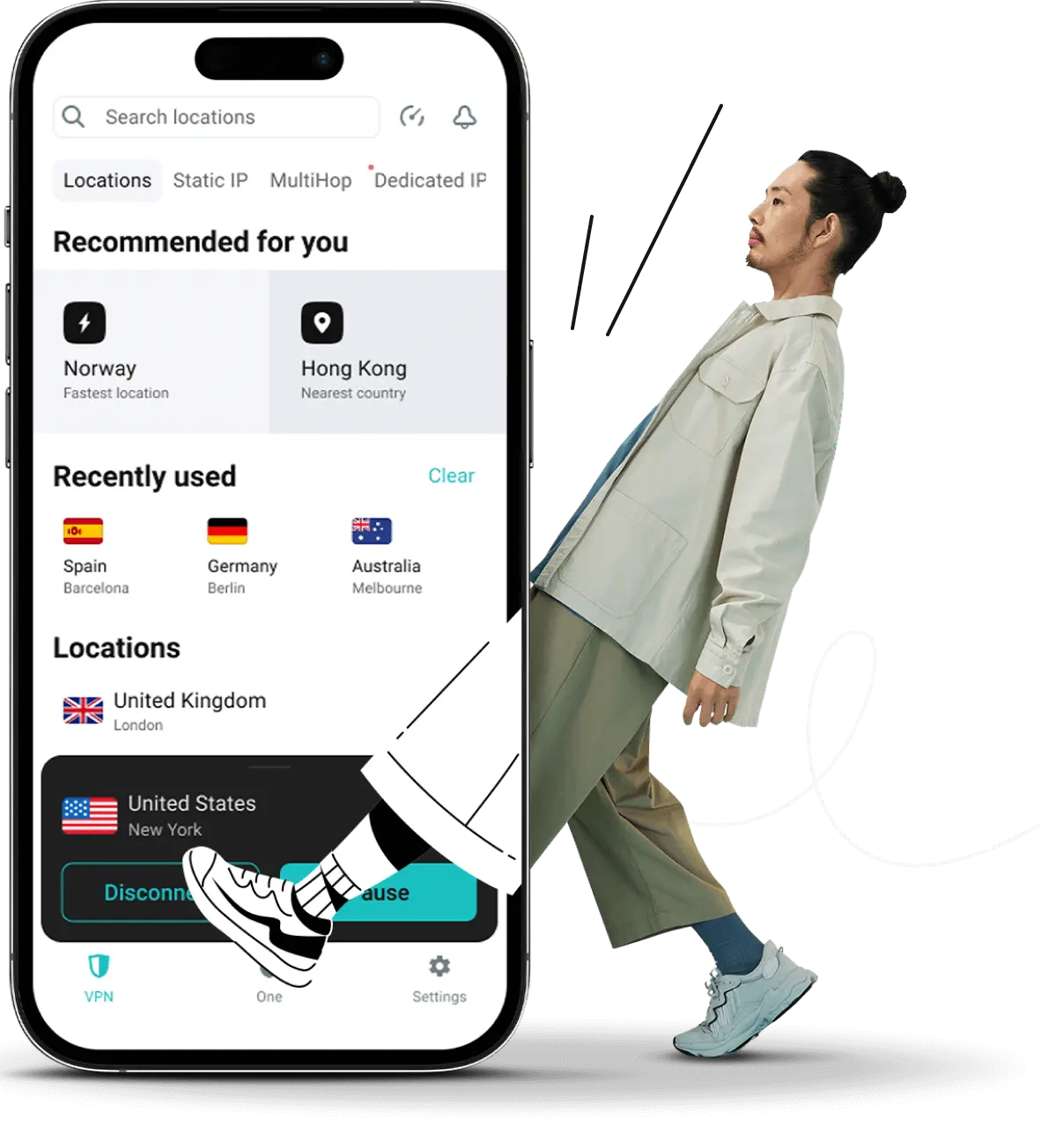The best VPN for fast speeds
- Secure your browsing with lightning-fast VPN speeds
- Boost your privacy across unlimited devices on one account
- Stream, shop, and surf confidently in one tap

What is a VPN?
A VPN (Virtual Private Network) is a service that creates a secure, encrypted connection between your device and the internet. It hides your real IP (Internet Protocol) address by routing your traffic through a private server, so anyone tracking your online activity sees the server’s location, not yours. VPN usage boosts your online privacy and security, protecting your data from hackers and prying eyes across multiple devices.
In-depth look: What is a VPN?
Why use a VPN?
Boost your security
Unsecured internet connections like public Wi-Fi are vulnerable to hackers and prying eyes. A VPN protects your data via an encrypted tunnel that stops unauthorized access to your online activity.
Protect your privacy
By masking your IP address, a VPN restricts online tracking from your ISP (Internet Service Provider). It also limits targeted ads, reducing the amount of personal info third parties can gather.
Access content safely
From browsing and gaming to shopping online, a VPN connection helps you access your favorite content with an added layer of defense. Nearby VPN servers let you do it all without sacrificing speed.

Why use a VPN?
Top Surfshark VPN benefits
User-friendly VPN app
Unlimited simultaneous connections
Lightning-fast speeds
Please note that using Surfshark services for any illegal activities is strictly forbidden and violates our Terms of Service. Make sure that any use of Surfshark services for your particular activities conforms to all relevant laws and regulations, including those of any service providers and websites you access using Surfshark.
Our global VPN server network
- 4500+ VPN servers in 100 locations across 6 continents
- 10Gbps+ servers with blazing-fast VPN speeds
- 100% RAM-only servers that keep your data private

Why choose Surfshark?
| Connection speed* | 460Mbps | 220Mbps | 165Mbps | 176Mbps | - |
| Number of devices | Unlimited | 10 | 7 | 12 | 5 |
| Ad and tracker blocking | |||||
| Complete antivirus solution | |||||
| Data leak monitoring | |||||
Date of comparison: November 21, 2025
*VPN speeds are based on Techradar research. Find the full report here.
Comparing VPN providers? Here’s how Surfshark stands out
ExpressVPN
ProtonVPN
PIA
CyberGhost
IPVanish
NordVPN
Surfshark vs. a free VPN
Superior performance
Real privacy
Trusted protection
Compare VPN plans
Get SurfsharkWhat’s everyone saying about Surfshark?
At Surfshark, we strive to give every internet user a smooth, satisfying experience with our VPN service. But don’t take our word for it — see what everyone’s saying about Surfshark VPN.
“Surfshark is a highly polished and powerful VPN that competes with the very best premium providers, all while offering a seriously tempting price point.”
“The balanced offering of security-boosting features, an expansive server network, and budget-friendly prices make Surfshark a worthy contender to the throne in our overall best VPN rankings.”
“Surfshark is undoubtedly one of the best VPNs of 2025, thanks to its stellar performance in various categories and robust features.”



Frequently asked questions
What devices can I use a VPN service on?
What is the best VPN service?
There isn’t one product that’s objectively the best VPN service. While we recommend trying out different options, the best VPNs offer advanced security features, robust encryption and IP address masking, and an extensive server network.
For instance, Surfshark offers enhanced privacy measures, 4500+ servers in 100 countries, fast connection speeds, and many features to upgrade your online security. You can even take our VPN for a test drive with our 30-day money-back guarantee. If our service isn’t the best VPN for you, you can request a refund within 30 days of purchasing.
How does a VPN work?
A VPN (Virtual Private Network) creates a secure, encrypted tunnel between your device and the internet. When you connect to a VPN, your data is routed through a VPN server, which assigns you a new IP address instead of the IP you’re assigned by your ISP (Internet Service Provider).
This process masks your real location and makes it appear as though your traffic is coming from the server's location. All data sent and received is encrypted, ensuring it remains private as it travels through the VPN tunnel. These secure connections help keep your online identity safe.
Can I use a VPN for free?
Yes, free VPNs are available, but using a VPN that’s free of charge isn’t recommended. Even the best free VPN won’t offer the same security or performance that a reliable paid VPN like Surfshark offers.
Free VPN providers frequently limit the number of servers users can access. With more devices sharing the same IP address, internet speeds tend to drop. Moreover, free VPNs frequently display ads or may even sell your data, making it possible for third parties to track your online activity.